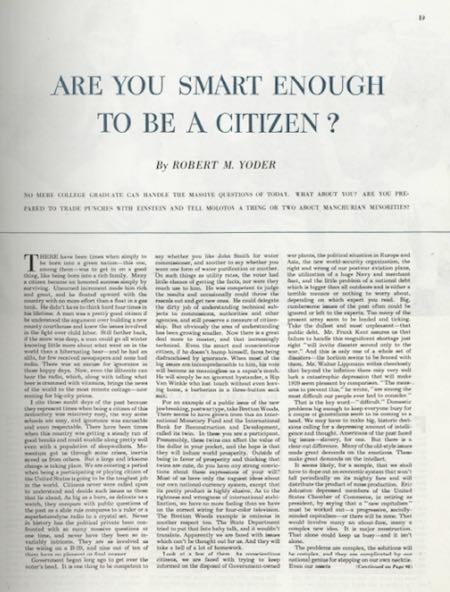Are You Smart Enough to Be a Citizen?
Are you smart enough to be a citizen? That question was posed 71 year ago by Robert M. Yoder. He realized that democracy in the postwar world needed well-educated voters.
In the past, he wrote, there had been little demand for Americans to be well informed. The average American “didn’t have to think hard four times in his lifetime.” The country enjoyed a steady run of breaks that allowed it to “muddle along pretty well even with a population of sleepwalkers.”
But the postwar world brought complicated questions that required thoughtful answers: How could the U.S. feed the starving people of Europe and Asia; how would we face the communist threat; and what were we supposed to do with this mysterious new creature, the International Monetary Fund?
The problems were both “terrifically important and terrifically dull. They may kill, but they don’t interest.” Americans would need to study hard, Yoder wrote, “and it is dry stuff.”
If smart voters were needed in 1946, they’re certainly in demand now. International hacking conspiracies, intricate healthcare proposals, and thorny foreign entanglements are the types of complex problems that average citizens are required to comprehend today. So how have American citizens, and voters, done in educating themselves? Not very well, according to the reports.
In 2010, a report from Yale University uncovered these discouraging facts:
- fewer than 50% of Americans had read any fiction or poetry in the preceding year
- only 57% had read any nonfiction work
- 49% of adults didn’t know how long it takes the Earth to circle the sun
- more than 50% of Americans didn’t know Genesis is the Bible’s first book
- 10% believed Joan of Arc was Noah’s wife
In 2011, Newsweek asked 1,000 American citizens to take the citizenship test. Nearly 40% failed.
- 29% couldn’t name the vice president
- 73% couldn’t correctly explain the Cold War
- 44% were unable to define the Bill of Rights
- 6% couldn’t point to Independence Day on a calendar
Just how difficult are the questions?
Before answering that question, note that the “civics test” is only one of four different tests an applicant must pass before citizenship is granted.
Applicants must first be able to speak sufficient English to a U.S. Citizenship and Immigration Services officer during an eligibility interview. Next, they must prove an ability to read English by reading aloud one of three sentences correctly. Then they must write out one of three sentences to prove an ability to write in English. Last, they must answer 6 out of 10 questions taken from a list of 100.
Below are 10 questions from the big list. If your citizenship rested on your ability to correctly answer 6 of them, would you be able to vote in the next election? Click here to see the answers.
- What does the Constitution do?
- What do we call the first 10 amendments to the Constitution?
- How many amendments does the Constitution have?
- What is the economic system in the United States?
- Who makes federal laws?
- The House of Representatives has how many voting members?
- We elect a U.S. Senator for how many years?
- Under our Constitution, some powers belong to the states. What is one power of the states?
- What happened at the Constitutional Convention?
- Name one U.S. territory.
Too easy? See all 100 questions.

Featured image: A naturalization ceremony at Grand Canyon National Park, September 24, 2010 (Wikimedia Commons, Grand Canyon National Park via Creative Commons Attribution 2.0 Generic)